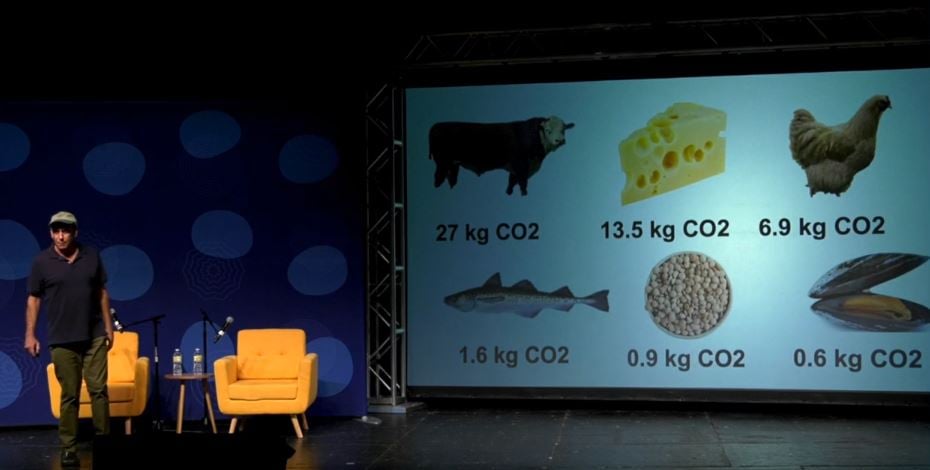
Adrian Huq Photo.
Eat less shrimp. Ditch beef and cheese. Embrace clams, oysters, and mussels. Adopt a pescatarian lifestyle.
On Wednesday afternoon, environmental writer and scholar Paul Greenberg brought those recommendations for a climate-friendly diet to the International Festival of Arts & Ideas in a discussion with veteran broadcast journalist John Dankosky, director of events at the CT Mirror and director of news and audio for Science Friday. Titled “The Power of Choice in Climate Change,” the discussion covered issues facing fish and the fish industry, climate-friendly food choices, and the power that individual choices have. It brought about 20 attendees out to the Yale Repertory Theater, with additional people watching remotely.
Greenberg grew up fishing on Long Island Sound, only to find as an adult that a lot of the fish he encountered in the past had disappeared. He described the change of seeing four main varieties of fish—salmon, tuna, bass, and cod—at the market as “really disturbing,” worrying that the same homogenization seen in land foods would spread to the ocean.
Greenberg said that current issues impacting fish include increased aquaculture production, dams blocking fish migration and eradicating species, dead zones in the water created by nitrogen leaching from land food agriculture, and federal environmental protection rollbacks.
But fish are currently facing an even bigger issue: climate change. Upon seeing that the waters of the Bering Sea were becoming too hot for salmon to survive, Greenberg knew that climate change had to be a part of his discussions.
“You cannot talk about fish, you cannot talk about food, without talking about climate,” he said. “I started to realize I can’t just do my usual Four Fish talk, I have to do a climate talk as well.”
Throughout the talk, he gave attendees actionable suggestions that they can implement in their own diets. For instance, though shrimp is the most consumed seafood in America, Greenberg described it as the “worst seafood choice you can make” given how carbon intensive shrimp are to raise. Moreover, clearing mangroves to make space for shrimp farming creates additional climate devastation.
But Greenberg encouraged the reexamination of humans’ land food consumption as well. Cheese, for instance, has a larger carbon footprint than wild fish. “A lot of times when people get critical of seafood, they don’t look at the whole, huge effect of land food. And land food is extremely carbon intensive.”
Greenberg ultimately recommended a plant-based diet with a healthy dose of sustainable seafood. He advocated for a “pesca-terranean” diet, which mixes the Mediterrean diet with seafoods like anchovies, clams, and seaweed. He pointed to wild fish, lentils, and mussels as great, low-carbon food choices.
“We want to move away from the large, predatory fish. We want to move away from those really high-carbon intensive land animals that we’re eating. And we want to come in balance with our planet. And to me, if we eat this way, that’s one step all of us can take to be better citizens of the planet,” Greenberg said.
Greenberg also suggested that consumers subscribe to community supported fisheries (one of which exists right here in New Haven) in order to support small fishermen through a direct-to-consumer model. He advised listeners to “eat locally logically” no matter their current diet by eating foods that are in season, avoiding long drives to purchase sustainable foods, and buying from family farms if beef or pork are still on your personal menu.
People can swap beef for chicken, or even eat invasive species specific to their area, such as blue catfish for New Englanders.
In the words of Dankosky, can people really “vote with our forks?” What is the effect of individual dietary choices on the global issue of climate change? Greenberg said he believes that kitchens can be a place where climate change can be confronted, and he views individual action and lifestyle change as a cause worth fighting for.
“Should we do something, or should we do nothing? Clearly, we can’t do nothing…At the end of our lives, to be able to have said that we did something instead of nothing is important.”
The event concluded with a book signing of two of Greenberg’s books, The Climate Diet and Four Fish, in collaboration with local bookstore Possible Futures.